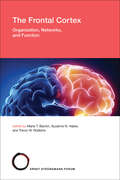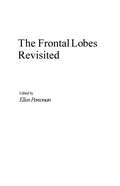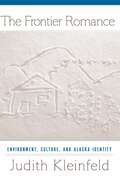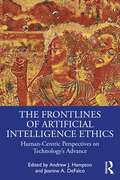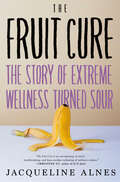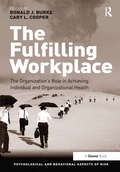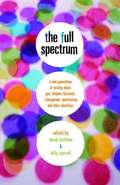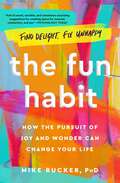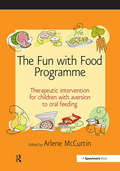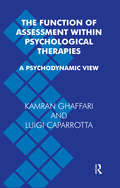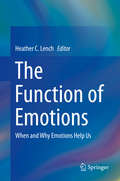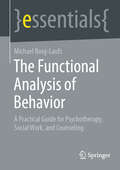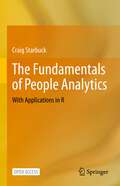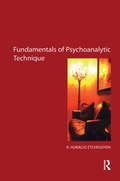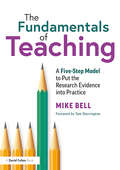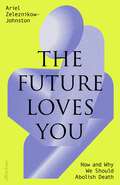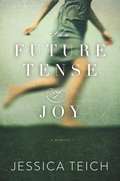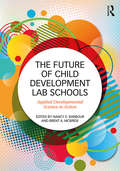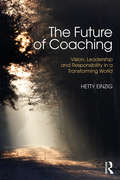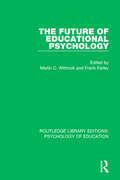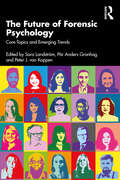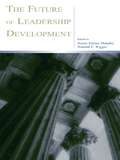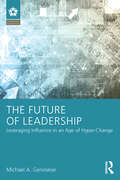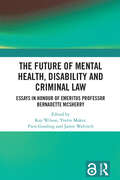- Table View
- List View
The Frontal Cortex: Organization, Networks, and Function (Strüngmann Forum Reports #35)
by Trevor W. Robbins Marie T. Banich Suzanne N. HaberAn in-depth investigation of the structure, neuronal mechanisms, and computations of the frontal lobe that enable higher-level thought.Experts from neurobiology, neuroanatomy, evolutionary biology, cognitive neuroscience, computational neuroscience, and clinical science examine how the neuronal structure of the frontal lobes enables unique aspects of higher-level thought. Implications for understanding disrupted function in neurological and psychiatric disorders, as well as societal issues, such as volitional control of behavior and educational practice, are also considered.
The Frontal Lobes Revisited (Institute for Research in Behavioral Neuroscience Series)
by Ellen PerecmanExperts in neuropsychology examine key issues in research involving the frontal lobes.
The Frontier Romance: Environment, Culture, and Alaska Identity
by Judith KleinfeldAnyone curious about what drew people like Christopher McCandless (the subject of Into the Wild) and John Muir to Alaska will find nuanced answers in Frontier Romance, Judith Kleinfeld’s thoughtful study of the iconic American love of the frontier and its cultural influence. Kleinfeld considers the subject through three catagories: rebellion, redemption, and rebirth; escape and healing; and utopian community. Within these categories she explores the power of narrative to shape lives through concrete, compelling examples—both heart-warming and horrifying. Ultimately, Kleinfeld argues that the frontier narrative enables Americans—born or immigrant—to live deliberately, to gather courage, and to take risks, face danger, and seize freedom rather than fear it.
The Frontlines of Artificial Intelligence Ethics: Human-Centric Perspectives on Technology's Advance
by Andrew J. HamptonThis foundational text examines the intersection of AI, psychology, and ethics, laying the groundwork for the importance of ethical considerations in the design and implementation of technologically supported education, decision support, and leadership training. AI already affects our lives profoundly, in ways both mundane and sensational, obvious and opaque. Much academic and industrial effort has considered the implications of this AI revolution from technical and economic perspectives, but the more personal, humanistic impact of these changes has often been relegated to anecdotal evidence in service to a broader frame of reference. Offering a unique perspective on the emerging social relationships between people and AI agents and systems, Hampton and DeFalco present cutting-edge research from leading academics, professionals, and policy standards advocates on the psychological impact of the AI revolution. Structured into three parts, the book explores the history of data science, technology in education, and combatting machine learning bias, as well as future directions for the emerging field, bringing the research into the active consideration of those in positions of authority. Exploring how AI can support expert, creative, and ethical decision making in both people and virtual human agents, this is essential reading for students, researchers, and professionals in AI, psychology, ethics, engineering education, and leadership, particularly military leadership.
The Fruit Cure: The Story of Extreme Wellness Turned Sour
by Jacqueline Alnes"lucid and elegant" - The Washington Post"A deeply compelling read ... Spellbinding ...." - BookPage "Her journey from desperation to self-acceptance is moving and well rendered. In the crowded medical memoir field, this stands out." -- Publishers Weekly A powerful critique of the failures in our healthcare system and an inquiry into the sinister strains of wellness culture that prey on people&’s vulnerabilities through schemes, scams, and diets.Jacqueline Alnes was a Division One runner during her freshman year of college, but her season was cut short by a series of inexplicable neurological symptoms. What started with a cough, escalated to Alnes collapsing on the track and experiencing months of unremembered episodes that stole her ability to walk and speak. Two years after quitting the team to heal, Alnes&’s symptoms returned with a severity that left her using a wheelchair for a period of months. She was admitted to an epilepsy center but doctors could not figure out the root cause of her symptoms. Desperate for answers, she turned to an online community centered around a strict, all-fruit diet which its adherents claimed could cure conditions like depression, eating disorders, addiction, anxiety, and vision problems. Alnes wasn&’t alone. From all over the world, people in pain, doubted or dismissed by medical authorities, or seeking a miracle diet that would relieve them of white, Western expectations placed on their figures, turned to fruit in hopes of releasing themselves from the perceived failings of their bodies.In The Fruit Cure, Jacqueline Alnes takes readers on a spellbinding and unforgettable journey through the world of fruitarianism, interweaving her own powerful narrative with the popularity and problematic history of fruit-based, raw food lifestyles. For readers plagued by mysterious symptoms, inundated by messages from media about how to attain &“the perfect body,&” or caught in the grips of a fast-paced culture of capitalism, The Fruit Cure offers a powerful critique of the failures of our healthcare system and an inquiry into the sinister strains of wellness culture that prey on people&’s vulnerabilities through schemes, scams, and diets masquerading as hope.
The Fulfilling Workplace: The Organization's Role in Achieving Individual and Organizational Health (Psychological and Behavioural Aspects of Risk)
by Ronald J. BurkeIt is very easy for organizations to ignore or overlook the impact of social and commercial change-of increased pressure to deliver profit (above all else) and of transformation in the ways in which we are now working-on the mental health and, consequently, the performance of their employees. And yet there is plenty of evidence that in many workplaces, performance is down, stress is up and professional employees are struggling to balance their home and work lives. This collection, while looking at individuals, places the spotlight on organizational initiatives to support the development of attitudes, values, character and behaviors in employees. The aim of these initiatives is to increase our resilience to those experiences and events which impact on performance. There is a particular focus on managerial and professional jobs where employee discretion and commitment are critical. The Fulfilling Workplace extends the themes developed in early titles in the Psychological and Behavioral Aspects of Risk Series deeper into organizations; to explore the organization's role in coming to grips both with human frailties and toxic workplaces-both destructive to individual and organizational health.
The Full Spectrum: A New Generation of Writing about Gay, Lesbian, Bisexual, Transgender, Questioning, and Other Identities
by David Levithan Billy MerrellTeens are more aware of sexuality and identity than ever, and they’re looking for answers and insights, as well as a community of others. In order to help create that community, YA authors David Levithan and Billy Merrell have collected original poems, essays, and stories by young adults in their teens and early 20s. The Full Spectrum includes a variety of writers—gay, lesbian, bisexual, straight, transitioning, and questioning—on a variety of subjects: coming out, family, friendship, religion/faith, first kisses, break-ups, and many others. <P><P> This one of a kind collection will, perhaps, help all readers see themselves and the world around them in ways they might never have imagined. We have partnered with the Gay, Lesbian and Straight Education Network (GLSEN) and a portion of the proceeds from this book will be donated to them.
The Fun Habit: How the Pursuit of Joy and Wonder Can Change Your Life
by Mike RuckerDoesn’t it seem that the more we seek happiness, the more elusive it becomes? <p><p>There is an easy fix: fun is an action you can take here and now, practically anywhere, anytime. Through research and science, we know fun is enormously beneficial to our physical and psychological well-being, yet fun’s absence from our modern lives is striking. Whether you’re a frustrated high-achiever trying to find a better work-life balance or someone who is seeking relief from life’s overwhelming challenges, it is time you gain access to the best medicine available.
The Fun with Food Programme: Therapeutic Intervention for Children with Aversion to Oral Feeding
by Arlene McCurtinContributors: Arlene McCurtin, Damhnait Ni Mhurchu, Petro van deventer, Marie Kennedy, Ger McGuirk, Trish Morrison, Jeni Malone
The Function of Assessment Within Psychological Therapies: A Psychodynamic View
by Luigi Caparrotta Kamran GhaffariThere are various different psychological therapies but their shared aim is to help the sufferers of mental disorders. The role of assessment and the decisions following that are crucial in the treatment process. The first encounter between the patient and the assessor defines the problem and shapes the possible treatment model. However, formal training in assessment is non-existent. This volume attempts to offer guidelines for assessment and it also offers general information on assessment in a concise form, with the help of clinical vignettes and case examples. The purpose has been to keep the book as simple as possible so that it may be easily accessible to beginners as well as to provide an initial structure and overview for more experienced practitioners. We therefore hope that this work may serve as a useful guide for referrers, trainees and therapists practicing in a variety of psychotherapeutic settings, including those in the National Health Service and in private practice, and begin to foster further debate in this field.
The Function of Emotions: When And Why Emotions Help Us
by Heather C. LenchThis eye-opening text brings together research from behavioral science, neuroscience, and other fields to make a cogent case for emotions acting as a practical framework for living our lives. A dozen basic emotions are analyzed in terms of what causes them, how they change thoughts and behaviors, and the functional value of these responses. Contrary to the common idea of emotions as fleeting occurrences, they are shown as having the potential for lasting impact on moods, thoughts, and behaviors. Intriguing findings assert that even negative emotions such as jealousy and anger can have positive results such as promoting positive goals, and can lead to successful outcomes in overarching domains such as cognition and well-being. Among the topics covered: · How fear and anxiety promote attention and protective behavior. · How sadness and depression promote analysis of complex problems in goal-pursuits. · How happiness promotes processing and attention. · How love promotes relationship development and goal attainment. · How pride promotes sense of self and identity. The Function of Emotions is a valuable resource for students, researchers, and clinicians interested in the psychology and neuroscience of emotions and their function in everyday life. It will attract an interested readership among professionals working in such fields as education, management and leadership, social work, and psychotherapy.
The Functional Analysis of Behavior: A Practical Guide for Psychotherapy, Social Work, and Counseling (essentials)
by Michael Borg-LaufsFunctional behavioral analysis makes it possible to better understand the symptoms of psychotherapy patients and counseling clients and to develop appropriate help options. Not only observable behaviors are taken into account, but also internal processes such as cognitions, feelings and the violation of basic psychological needs. In this volume, the method of functional behavior analysis is explained step by step so that readers can apply it themselves. It also shows how psychotherapies and psychosocial counseling processes can be planned on this basis. The functional analysis of human behavior helps to tailor case planning to the individual. This applies to almost every problem that professional helpers are confronted with in counseling and therapy. This Springer essential is a translation of the original German 1st edition essentials, Die Funktionale Verhaltensanalyse by Michael Borg-Laufs, published by Springer Fachmedien Wiesbaden GmbH, part of Springer Nature in 2020. The translation was done with the help of artificial intelligence (machine translation by the service DeepL.com). A subsequent human revision was done primarily in terms of content, so that the book will read stylistically different from a conventional translation. Springer Nature works continuously to further the development of tools for the production of books and on the related technologies to support the authors.
The Functions of Parent-Child Argumentation
by Antonio BovaThis book provides a detailed examination of argumentative interactions in families with young children during mealtimes. It explores both the restrictions and the opportunities family mealtimes present and the types of issues addressed through argumentative discussions. Antonio Bova puts forward an in depth analysis of how both parents and children contribute to the inception and development of an argumentative discussion, and the categories of argument adopted most often by the two groups. Drawing upon a wealth of qualitative data from the recorded mealtime conversations of Italian and Swiss-Italian middle-class families, the author examines the crucial importance of argumentative interactions between parents and children during mealtimes. This book builds on recent advances in the study of the psychology of social interaction and sheds new light on the importance of argumentation at all stages of life.
The Fundamentals of People Analytics: With Applications in R
by Craig StarbuckThis open access book prepares current and aspiring analytics professionals to effectively address this need by curating key concepts spanning the entire analytics lifecycle, along with step-by-step instructions for their applications to real-world problems, using ubiquitous and freely available open-source software. This book does not assume prior knowledge of statistics, how to query databases, or how to write performant code; early chapters include an introduction to R and SQL as well as an overview of statistical foundations.Human capital is an organization’s most important asset. Without the knowledge and skills of people, an organization can accomplish nothing. The acquisition, development, and retention of critical talent has become increasingly more complex and challenging, and organizations are making significant investments to gain a deeper, data-informed understanding of organizational phenomena impacting the bottom line. By the end of this book, readers will be able to: • Design and conduct empirical research • Query and wrangle data using SQL • Profile, clean, and analyze data using R • Apply appropriate statistical and ML models to a range of people analytics use cases • Package and present analyses to communicate impactful insights to stakeholders
The Fundamentals of Psychoanalytic Technique
by R. Horacio EtchegoyenThis book presents the theories and observations of each major contributor to the discussion of psychoanalytic technique and reveals the particular advantages and disadvantages which fall to the various theoretical positions and orientations adopted by each contributor.
The Fundamentals of Teaching: A Five-Step Model to Put the Research Evidence into Practice
by Mike BellTeachers are bombarded with advice about how to teach. The Fundamentals of Teaching cuts through the confusion by synthesising the key findings from education research and neuroscience to give an authoritative guide. It reveals how learning happens, which methods work best and how to improve any students’ learning. Using a tried-and-tested, Five-Step model for applying the methods effectively in the classroom, Mike Bell shows how you can improve learning and eliminate time-consuming, low-effect practices that increase stress and workload. He includes case studies from teachers working across different subjects and age groups which model practical strategies for: Prior Knowledge Presenting new material Setting challenging tasks Feedback and improvement Repetition and consolidation. This powerful resource is highly recommended for all teachers, school leaders and trainee teachers who want to benefit from the most effective methods in their classrooms.
The Future Loves You: How and Why We Should Abolish Death
by Dr Ariel Zeleznikow-JohnstonA brilliant young neuroscientist explains how to preserve our minds indefinitely, enabling future generations to choose to revive usJust as surgeons once believed pain was good for their patients, some argue today that death brings meaning to life. But given humans rarely live beyond a century – even while certain whales can thrive for over two hundred years – it’s hard not to see our biological limits as profoundly unfair. No wonder then that most people nearing death wish they still had more time.Yet, with ever-advancing science, will the ends of our lives always loom so close? For from ventilators to brain implants, modern medicine has been blurring what it means to die. In a lucid synthesis of current neuroscientific thinking, Zeleznikow-Johnston explains that death is no longer the loss of heartbeat or breath, but of personal identity – that the core of our identities is our minds, and that our minds are encoded in the structure of our brains. On this basis, he explores how recently invented brain preservation techniques now offer us all the chance of preserving our minds to enable our future revival.Whether they fought for justice or cured diseases, we are grateful to those of our ancestors who helped craft a kinder world – yet they cannot enjoy the fruits of the civilization they helped build. But if we work together to create a better future for our own descendants, we may even have the chance to live in it. Because, should we succeed, then just maybe, the future will love us enough to bring us back and share their world with us.
The Future Tense of Joy: A Memoir
by Jessica Teich"'No one was less likely to take her own life.’ That’s what her Oxford thesis advisor wrote. From the moment I stumbled across the obituary, late at night when I couldn’t sleep, I was captivated, and it wasn’t the terrible details of her death: That she leapt from the balcony of a high rise in Century City. That she was 27, and a newlywed.” So begins Jessica Teich’s quest to unravel a mystery: the suicide of someone she never met. Bright and accomplished, with a loving family, Jessica knows she should be happy. But a violent childhood has left its mark. Jessica fears she will never be free of her past-until she discovers the obituary of a young woman, whose life is a ghostly echo of her own. Can Jessica discover what drove this brilliant young woman to kill herself? And will discovering the truth save Jessica from the fissures tearing apart her own life? A deeply intimate psychological memoir, The Future Tense of Joy is the luminous account of one woman’s efforts to free herself, and her family, from the demons of the past. Witty, brave and suspenseful, the book has been hailed by Meryl Streep as "beautiful, compassionately imagined.” Steve Martin called it "a daring and intimate journey into the soul of motherhood.”
The Future of Child Development Lab Schools: Applied Developmental Science in Action
by Nancy Barbour Brent A. McBrideChild development laboratory schools are found on college and university campuses throughout the U.S. Over the last century, they have acquired a long, rich history. Originally seen as settings for the new field of child study in the early 1900s, their functions have evolved over time. These programs often play a central role in supporting teaching, research, and outreach/engagement activities in the fields of child development and early childhood education. Yet, many have had to fight for their existence when economic times have gotten difficult. Many long-running programs have had to close. This book provides a unique perspective on the purpose and function of child development laboratory schools and the potential of large-scale research to examine important world problems. The individual stories presented are real stories that offer reasonable solutions and ideas for maximizing the value of these venerable institutions. Most importantly, the authors demonstrate how child development laboratory schools can address the criticisms often lodged regarding their lack of relevancy and focus on real-life problems and solutions. The range of perspectives includes university faculty trying to maximize research that is applied in nature as well as redefining what and where a laboratory is, both in the university and in the community. The message is clear that child development laboratory schools are alive and well, and continuing to evolve.
The Future of Coaching: Vision, Leadership and Responsibility in a Transforming World
by Hetty EinzigWe live in a world that is volatile, uncertain, complex and ambiguous, in which our work and lives are constantly disrupted and changing. But coaches and leaders are still trained to operate within stable models with a uni-focus on performance. Coaches are starting to question the remit of ‘raising performance’ within existing systems, many of which are outdated, dysfunctional and even toxic. The role of the coach today must evolve to become fit for purpose in challenging times and coaching must re-articulate its values, as the essential compass for navigating turbulent waters. In The Future of Coaching, Hetty Einzig examines the role of coaching and leadership in the twenty-first century, and sets out a compelling vision for its future. Drawing on experience gained over twenty-five years of coaching leaders in the corporate and public sectors, in the UK and globally, she challenges the tenet of coaching neutrality. Rather than simply following the client agenda, she encourages coaches to see themselves as partners in courageous leadership and to work towards building an ethical, holistic and networked coaching approach to help create businesses that serve society and our globalised world. The book asks essential questions of coaches working today: how can leaders and coaches become ‘positive deviants’ and transform the rules of the game within cultures where denial and group-think are rife? How can coaches work with the anxious and depressed, embracing the dark as well as the light? Are coaches prepared for the rise of Millennials, women leaders and those over sixty (the Third Acters)? Einzig challenges the model of the Strong Leader in favour of Respons-able leadership based on authentic strength, distributed power and responsive thinking. And she shows how this vision of a transformed workplace is essential for the transformations society must undertake to reclaim a positive future. This thought provoking collection of essays, designed to be read in any order, is enlightening and inspiring reading for coaches in practice and in training, HR and L&D professionals and for leaders everywhere.
The Future of Educational Psychology (Routledge Library Editions: Psychology of Education)
by Merlin C. Wittrock Frank FarleyOriginally published in 1989, this title for the first time in one volume, organized and discussed the fundamental advances in theory, technology, and research methods in educational psychology, at the time. The book provides comprehensive, integrated reviews and discussions of recent advances of the day in such areas as learning, cognition, instruction, and applications to curriculum.
The Future of Forensic Psychology: Core Topics and Emerging Trends
by Pär Anders Granhag Sara Landström Peter J. van KoppenThe Future of Forensic Psychology: Core Topics and Emerging Trends is an authoritative text that presents state-of-the-art research from rising stars in the field. Presented in an accessible way, it draws on cutting-edge research to analyse both core topics and current trends in forensic psychology. Borne out of the internationally recognized House of Legal Psychology doctorate programme, the book features eighteen authors from different international contexts who evaluate current and emerging topics in the field. The book is divided into three sections; eyewitness memory and testimony, investigative interviewing and, deception detection and legal decision making. Each section contains in-depth research and includes classics topics such as factors affecting eyewitnesses and determining deceit in investigations. The book also covers newer exciting developments within the field, including credibility in asylum contexts, alibies and cross-cultural aspect of interviewing. Offering an insightful summary of the field today, this book is an indispensable read for students and researchers of forensic psychology, legal psychology and criminology. It will also be of great interest to practitioners in the judicial system.
The Future of Leadership Development (Applied Psychology Series)
by Ronald E. Riggio Susan Elaine MurphyLeadership in today's organizations is a tough business. Organizational leaders face a number of challenges as their jobs, and the world around them, become increasingly complex. Trends, such as organizational "delayering," rapid technological advances, and increased employee empowerment require that leaders adapt their techniques and styles of leadership to meet these new challenges. Consequently, there has been an explosion of interest in leadership in recent years as researchers and management educators struggle to understand the process of leadership development, how it operates, and what characteristics make effective leaders. Born of these questions, the 11th Annual Kravis-de Roulet Leadership Conference at Claremont McKenna College brought together an impressive slate of scholars whose theories, research, and cutting-edge techniques are now gathered together in this impressive volume. Each chapter asks and answers questions about the current state of the field while providing future direction for research to help bridge the gap between leadership researchers and leadership development practitioners. Notable topics include chapters on "e-leadership" and leadership within the "virtual" organization, exploring 360-degree feedback, the importance of "social capital," and a comprehensive analysis of the well-researched theory of Leader Member Exchange.
The Future of Leadership: Leveraging Influence in an Age of Hyper-Change (Leadership: Research and Practice)
by Michael A GenoveseThe Future of Leadership considers how the rapid changes of today will affect the leaders of tomorrow. Renowned Leadership scholar Michael A. Genovese argues that one of the key challenges for future leaders will be to effectively and constructively manage the ‘hyper-change’ taking place both within organizations and in the broader social and political spheres. Taking a Futures Studies approach to envision the state of leadership in the coming decades, Genovese also provides case studies of leaders who have already demonstrated the mind- and skill-sets necessary to successfully manage rapid change.
The Future of Mental Health, Disability and Criminal Law
by Piers Gooding Yvette Maker Kay Wilson Jamie WalvischThis book brings together contributions from twenty-three world-leading scholars and commentators that address a range of contemporary and pressing international themes in mental health, disability and criminal law. The authors use the work of internationally renowned academic, Emeritus Professor Bernadette McSherry, as a springboard to reflect on recent developments in these areas of law and to anticipate the future directions they may take. In doing so, they aim to inform and inspire a new generation of mental health, disability and criminal law scholars, advocates and reformers. The book is divided into four substantive sections: reforming mental health and disability law; regulating coercion and restrictive practices; improving access to justice and the criminal law; and transforming mental health law. It also includes an introduction from the editors and an afterword from Emeritus Professor McSherry. The book is aimed at regulators, policymakers, lawyers, clinicians, consumer advocates and academics who are interested in the urgent and contentious issues surrounding the reform and development of mental health, disability and criminal law. It will help them understand the key issues and problems and presents suggestions for reform. The book is interdisciplinary and international in its focus.
